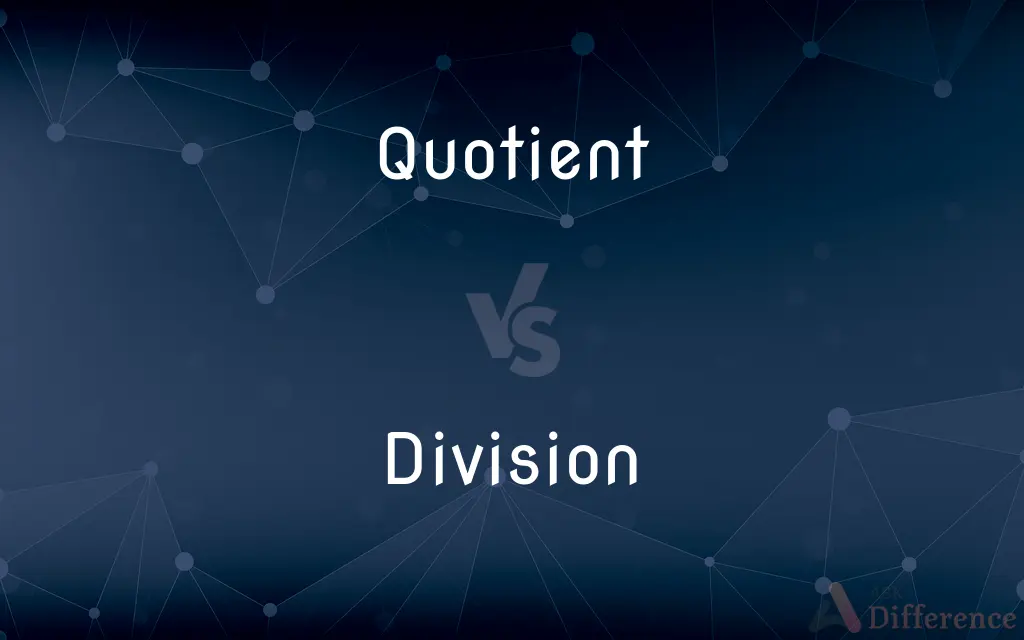Quotient vs. Division — What's the Difference?
By Fiza Rafique & Urooj Arif — Updated on May 6, 2024
A quotient is the result of dividing one number by another, while division is the mathematical operation itself that involves splitting a number into equal parts.

Difference Between Quotient and Division
Table of Contents
ADVERTISEMENT
Key Differences
A quotient is the outcome you receive after performing division, representing the number of times one value is contained in another. Division, on the other hand, is the operation itself that involves determining this quotient by separating a quantity into equal portions.
The quotient is a specific value calculated after dividing, like "5" when dividing 10 by 2. Division involves the process of computing that result, where you divide the dividend (10) by the divisor (2).
In arithmetic, the quotient directly shows how many times the divisor fits into the dividend. Division, however, refers to the entire calculation, possibly including finding remainders or working with fractional results.
Quotient can also refer to the whole number outcome of division, as well as the result of polynomial division. Division, meanwhile, represents the fundamental concept of distributing a number evenly across parts.
The quotient provides a clear answer to a division problem, whereas division itself can require various methods, depending on whether the numbers involved are whole, decimal, or fractions.
ADVERTISEMENT
Comparison Chart
Definition
Result of a division calculation
Mathematical operation involving division
Role
Final value obtained after dividing
Process of computing the quotient
Types
Integer, floating-point, polynomial
Long, short, with remainder, etc.
Examples
10 ÷ 2 = 5 (quotient is 5)
Splitting numbers, fractions, etc.
Concept
Resulting value
Calculation process
Compare with Definitions
Quotient
The result after dividing one number by another.
When dividing 20 by 4, the quotient is 5.
Division
The process of finding how many times one number is contained in another.
Division of 36 by 6 gives 6.
Quotient
The final result in partial division.
The quotient of 10 divided by 4 is 2.5.
Division
Splitting into equal parts.
Division of the inheritance was done fairly.
Quotient
The result of dividing one polynomial by another.
The quotient of (x^2 - 1) divided by (x - 1) is (x + 1).
Division
An operation involving separating numbers.
Division is often considered the inverse of multiplication.
Quotient
The numeric result of a division calculation.
The quotient of 15 divided by 3 is 5.
Division
Using division to determine fractional results.
Long division is used to divide large numbers.
Quotient
The integer portion of the result.
The quotient of 17 divided by 3 is 5, with a remainder of 2.
Division
Involves multiplying by the reciprocal.
Division of 1/2 by 1/4 yields 2.
Quotient
In arithmetic, a quotient (from Latin: quotiens "how many times", pronounced ) is a quantity produced by the division of two numbers. The quotient has widespread use throughout mathematics, and is commonly referred to as the integer part of a division (in the case of Euclidean division), or as a fraction or a ratio (in the case of proper division).
Division
The action of separating something into parts or the process of being separated
A gene that helps regulate cell division
The division of the land into small fields
Quotient
The number obtained by dividing one quantity by another. In 45 ÷ 3 = 15, 15 is the quotient.
Division
Difference or disagreement between two or more groups, typically producing tension
A growing sense of division between north and south
Deep cultural divisions
Quotient
(arithmetic) The number resulting from the division of one number by another.
The quotient of 12 divided by 4 is 3.
Division
The process of dividing one number by another
No multiplication or division is necessary
Quotient
(arithmetic) The integer part of the result of such division.
The quotient of 13 divided by 4 is 3, and the remainder is 1.
Division
Each of the parts into which something is divided
The main divisions of the book
Quotient
(mathematics) By analogy, the result of any process that is the inverse of multiplication as defined for any mathematical entities other than numbers.
Division
A partition
The villagers lived in a communal building and there were no solid divisions between neighbours
Quotient
A quotum or quota.
Division
The act or process of dividing.
Quotient
The number resulting from the division of one number by another, and showing how often a less number is contained in a greater; thus, the quotient of twelve divided by four is three.
Division
The state of having been divided.
Quotient
The result of any process inverse to multiplication. See the Note under Multiplication.
Division
(Mathematics) The operation of determining how many times one quantity is contained in another; the inverse of multiplication.
Quotient
The ratio of two quantities to be divided
Division
The proportional distribution of a quantity or entity
The division of his property among his heirs.
Quotient
The number obtained by division
Division
Something, such as a boundary or partition, that serves to divide or keep separate.
Division
One of the parts, sections, or groups into which something is divided.
Division
An area of government or corporate activity organized as an administrative or functional unit.
Division
A territorial section marked off for political or governmental purposes.
Division
An administrative and tactical military unit that is smaller than a corps but is self-contained and equipped for prolonged combat activity.
Division
A group of several ships of similar type forming a tactical unit under a single command in the US Navy.
Division
A former unit of the US Air Force that was larger than a wing and smaller than an air force.
Division
(Botany) The taxonomic category ranking just below kingdom, consisting of one or more related classes, and corresponding approximately to a phylum in zoological classification.
Division
A category created for purposes of competition, as in boxing.
Division
Variance of opinion; disagreement.
Division
A splitting into factions; disunion.
Division
The physical separation and regrouping of members of a parliament according to their stand on an issue put to vote.
Division
(Biology) Cell division.
Division
A type of propagation characteristic of plants that spread by means of newly formed parts such as bulbs, suckers, or rhizomes.
Division
(uncountable) The act or process of dividing anything.
Division
Each of the separate parts of something resulting from division.
Division
The process of dividing a number by another.
Division
(arithmetic) A calculation that involves this process.
I've got ten divisions to do for my homework.
Division
(military) A formation, usually made up of two or three brigades.
Division
A usually high-level section of a large company or conglomerate.
Division
(taxonomy) A rank below kingdom and above class, particularly used of plants or fungi, also (particularly of animals) called a phylum; a taxon at that rank.
Magnolias belong to the division Magnoliophyta.
Division
A disagreement; a difference of viewpoint between two sides of an argument.
Division
(government) A method by which a legislature is separated into groups in order to take a better estimate of vote than a voice vote.
The House of Commons has voted to approve the third reading of the bill without a division. The bill will now progress to the House of Lords.
Division
(music) A florid instrumental variation of a melody in the 17th and 18th centuries, originally conceived as the dividing of each of a succession of long notes into several short ones.
Division
(music) A set of pipes in a pipe organ which are independently controlled and supplied.
Division
(legal) A concept whereby a common group of debtors are only responsible for their proportionate sum of the total debt.
Division
(computing) Any of the four major parts of a COBOL program source code.
Division
A lesson; a class.
Division
(Australia) A parliamentary constituency.
Division
The act or process of diving anything into parts, or the state of being so divided; separation.
I was overlooked in the division of the spoil.
Division
That which divides or keeps apart; a partition.
Division
The portion separated by the divining of a mass or body; a distinct segment or section.
Communities and divisions of men.
Division
Disunion; difference in opinion or feeling; discord; variance; alienation.
There was a division among the people.
Division
Difference of condition; state of distinction; distinction; contrast.
I will put a division between my people and thy people.
Division
Separation of the members of a deliberative body, esp. of the Houses of Parliament, to ascertain the vote.
The motion passed without a division.
Division
The process of finding how many times one number or quantity is contained in another; the reverse of multiplication; also, the rule by which the operation is performed.
Division
The separation of a genus into its constituent species.
Division
Two or more brigades under the command of a general officer.
Division
One of the groups into which a fleet is divided.
Division
A course of notes so running into each other as to form one series or chain, to be sung in one breath to one syllable.
Division
The distribution of a discourse into parts; a part so distinguished.
Division
A grade or rank in classification; a portion of a tribe or of a class; or, in some recent authorities, equivalent to a subkingdom.
Division
An army unit large enough to sustain combat;
Two infantry divisions were held in reserve
Division
One of the portions into which something is regarded as divided and which together constitute a whole;
The written part of the exam
The finance section of the company
The BBC's engineering division
Division
The act or process of dividing
Division
An administrative unit in government or business
Division
An arithmetic operation that is the inverse of multiplication; the quotient of two numbers is computed
Division
Discord that splits a group
Division
A league ranked by quality;
He played baseball in class D for two years
Princeton is in the NCAA Division 1-AA
Division
(biology) a group of organisms forming a subdivision of a larger category
Division
(botany) taxonomic unit of plants corresponding to a phylum
Division
A unit of the United States Air Force usually comprising two or more wings
Division
A group of ships of similar type
Division
The act of dividing or partitioning; separation by the creation of a boundary that divides or keeps apart
Common Curiosities
Can a quotient be a decimal?
Yes, when dividing two numbers that don't divide evenly, the quotient can be a decimal.
What is a quotient?
The quotient is the result obtained when one number divides another.
How is a quotient different from a remainder?
A quotient is the primary result of division, while the remainder is what is left over after the division.
How is a quotient calculated?
By dividing the dividend by the divisor.
What is long division?
Long division is a step-by-step method to divide larger numbers, often showing the remainder explicitly.
What is polynomial division?
It's the process of dividing one polynomial by another to find the quotient and remainder.
What is division?
Division is the arithmetic process that involves splitting a quantity by a specified number.
Can division be done with negative numbers?
Yes, division can handle negative numbers with specific rules for the signs.
What is the role of a divisor in division?
The divisor is the number that divides the dividend to find the quotient.
What is a divisor?
The number that divides another number.
Can division result in a remainder?
Yes, when the dividend isn't wholly divisible by the divisor.
Is division only for whole numbers?
No, division can be performed with fractions, decimals, and negative numbers as well.
Why is division important in math?
Division allows solving problems involving the distribution or partition of values.
Is division an arithmetic operation?
Yes, along with addition, subtraction, and multiplication.
How are quotient and product related?
The quotient is the result of division, while the product is the result of multiplication.
Share Your Discovery

Previous Comparison
Constable vs. Police
Next Comparison
Forgiveness vs. GraceAuthor Spotlight
Written by
Fiza RafiqueFiza Rafique is a skilled content writer at AskDifference.com, where she meticulously refines and enhances written pieces. Drawing from her vast editorial expertise, Fiza ensures clarity, accuracy, and precision in every article. Passionate about language, she continually seeks to elevate the quality of content for readers worldwide.
Co-written by
Urooj ArifUrooj is a skilled content writer at Ask Difference, known for her exceptional ability to simplify complex topics into engaging and informative content. With a passion for research and a flair for clear, concise writing, she consistently delivers articles that resonate with our diverse audience.













































